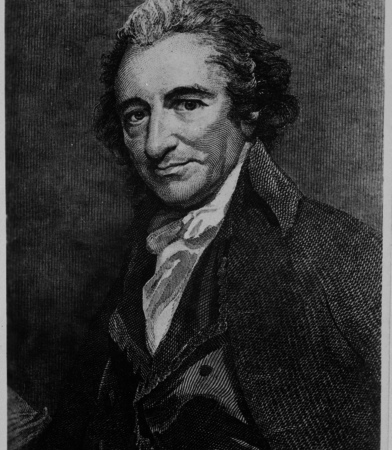
Join our mailing list for the latest news on Mobituaries, plus receive recommendations and exclusive offers on all of your favorite books and authors from Simon & Schuster.
By clicking “Sign Up” I acknowledge that I have read and agreed to the Privacy Policy and Terms of Use.
Join our mailing list for the latest news on Mobituaries, plus receive recommendations and exclusive offers on all of your favorite books and authors from Simon & Schuster.
By clicking “Sign Up” I acknowledge that I have read and agreed to the Privacy Policy and Terms of Use.
This past summer, guests lined up for a special event outside the legendary Greenwich Village piano bar, Marie’s Crisis.
Visitors were on hand to take part in a rather unusual performance -- a Mobituaries memorial do-over for a largely forgotten Founding Father: Thomas Paine.
It turns out Paine died on, or near, the site of Marie’s Crisis in 1809. In fact, the title of the bar is inspired by Paine’s series of American Crisis pamphlets published during the Revolutionary War, a rallying cry for citizens and soldiers alike.
Yet as Paine biographer Craig Nelson explained: “Today we have almost no idea who he is. People may have known he said ‘these are the times that try men's souls.’ They may know that he said ‘we have it in our power to begin the world over again.’ They may know that he wrote Common Sense but they don't really know who he is.”
Nelson said that “when Thomas Paine was alive he was the most famous person in the world. He knew everyone he knew Jefferson he knew Washington. He knew Robespierre he knew. I mean it's astonishing who has associations are.”
Yet when Paine died, only six people showed up at his funeral. The paltry obit that was published at the time summed up his life in this line: “He had lived long, did some good and much harm.”
Even after Paine died, he couldn’t rest in peace; a crazed fan dug up his bones.
In this episode, Mo Rocca tries to understand why Paine isn’t as well remembered as perhaps he ought to be.
In contrast with many of the other Founding Fathers, who came from money, Paine was born into humble circumstances in England. His life was a roller coaster of ups and downs. He won great praise but his writings also generated a great deal of controversy.
Paine’s groundbreaking pamphlet Common Sense is not only one of the best selling publications in American history; it was the intellectual spark that lit the fuse for the American Revolution.
Nelson elaborated on the significance of Common Sense: “He turns every single thing the British had been saying on their heads and comes up with an explanation for why Americans should go it alone and why it'll be great to be an American and we'll have this whole continent and we'll run our own affairs and we'll stop being insulted by the British.”
Paine also called for the end of hereditary monarchy which was a treasonous act at the time.
He would go on to write The American Crisis pamphlets, The Rights of Man and The Age of Reason. The latter publication became one of his most polarizing since Paine attacked organized religion.
The rather sad circumstances of Paine’s demise led up to the decision to host a memorial do-over at Marie’s Crisis complete with a musical production number written by Tony nominated composers Laurence O’Keefe and Nell Benjamin, as well as a roast by Daily Show comedian Lewis Black.
After all, make no mistake: No Paine … no gain of Independence!
Episode Extras










